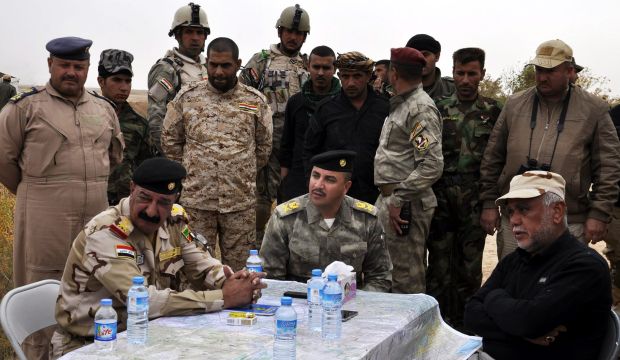
Head of the Iraqi Shi’ite militia the Badr Organization Hadi Al-Ameri (R) meets with military commanders near Samarra in northern Iraq, on March 4, 2015. (EPA/Ali Mohammed)
Salah Al-Din, Iraq, Asharq Al-Awsat—Without Iran’s military support, Iraq would fall completely into the hands of the Islamic State of Iraq and Syria (ISIS), one of Iraq’s most influential militia leaders said on Thursday, a day after Iraqi forces made considerable gains against radical militants in Tikrit.
Speaking to Asharq Al-Awsat, leader of the Badr Organization, an Iran-backed militia, Hadi Al-Ameri said: “Those complaining about the presence of Iranian advisers [in Iraq] better stand in tribute and respect to them. Without them and Qassem Suleimani the whole of Iraq would have been under the control of ISIS.”
Qassem Suleimani is the head of the most elite unit of the Iranian military, the Quds Force of the Iranian Revolutionary Guards Corps, and is currently commanding Shi’ite militias in battles against ISIS in Iraq.
The comments by Ameri come a day after an alliance of Iraqi regular forces and mostly Shi’ite militias advanced on Tikrit, the hometown of former dictator Saddam Hussein, forcing ISIS fighters into retreat. The liberation of Tikrit would bring Iraqi forces a step closer to retaking Mosul, the largest city under ISIS’s control.
Ameri, who is also a member of parliament, said the presence of Iranian military advisers is “a source of pride” for Iraqis whom he urged to “erect a statue of the hero [Suleimani] out of gratitude.”
Iranian commanders, most prominently Suleimani, have played a significant role in the fight against ISIS, providing Iraqi forces and Shi’ite militias with military advice.
“Iranian advisers accompany us on the battleground and provide us with their best advice. We are proud of them and they will help us to completely liberate Nineveh and Anbar after we liberate Tikrit and Kirkuk,” Ameri added.
The alliance of regular forces and mostly-Shi’ite militias, known as Hashed Shaabi, or Popular Mobilization forces, has been one of the most effective fighting forces in the battle against ISIS in Iraq.
However, many among Iraq’s minority Sunni population oppose the alliance and Iran’s growing influence in the country and fear revenge attacks by Shi’ite militias in the areas liberated from ISIS control.
“What is this sensitivity by some about the presence of Iranian advisers for?” Ameri asked, pointing out that there are more than 4,000 American military advisers in Iraq.
The US, which is leading an international aerial campaign against ISIS, has warned that the presence of Iranian advisers alongside Iraqi forces may rekindle sectarian tensions in the country.
Speaking at a press conference on Wednesday the US Secretary of Defense Ashton Carter said the role of Iranians in the war on ISIS in Iraq “is concerning to us, in particular because the sectarian danger in Iraq is the principal thing that can unravel the campaign against ISIS.”
Ameri, whose militia is part of the Popular Mobilization forces, called on Iraqis in ISIS controlled areas, such as Salah Al-Din, Anbar and Mosul, “not to trust US forces,” whom he said were “incapable of liberating a single Iraqi village.”
The militia leader praised Iran for giving advice “without expecting anything in return, in contrast to the Americans who put thousands of conditions on the use of weapons they sell to us.”
In comments to Asharq Al-Awsat on the latest advances in Tikrit, Federal Police Chief Maj. Gen. Raed Shakir Jawdat said his force’s strategy has changed from one of defense to attack.
“For five days our forces have been progressing in Salah Al-Din province, attacking ISIS from several sides,” Jawdat said on Thursday.
“We have completely cut all supply routes for ISIS who are now besieged in Tikrit.”
